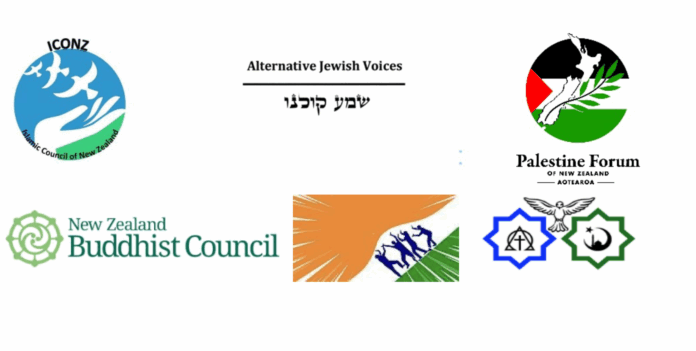Issued by: Islamic Council of New Zealand (ICONZ), Alternative Jews Voices (AJV), Palestine Forum of New Zealand (PFNZ), New Zealand Buddhist Council (NZBC), Aotearoa Alliance of Progressive Indians (AAPI), The Council of Christians and Muslims (CCM).
We, the undersigned, express our collective concern regarding the New Zealand Government’s proposed amendments to the Terrorism Suppression Act 2002, which seek to broaden the definition of terrorist activity and expand law enforcement powers, including warrantless searches and the criminalisation of planning or preparing for acts deemed as terrorism.
While we acknowledge the importance of safeguarding national security, we urge the government to ensure that any legislative changes are made with full transparency, meaningful public consultation, and in strict alignment with New Zealand’s domestic and international human rights obligations.
Global precedents have shown how counter-terrorism laws, when vaguely defined or broadly applied, can be misused to suppress legitimate dissent, advocacy, and humanitarian work. We highlight the following examples:
• In the United Kingdom, the recent proscription of Palestine Action group, a protest group engaged in nonviolent direct actions, under terrorism legislation has criminalized symbolic support and peaceful protest. Over 700 individuals have been arrested, manyfor non-violent actions such as holding placards. The UN High Commissioner for Human Rights condemned this move as a dangerous conflation of protest with terrorism, warning of its chilling effect on freedom of expression and assembly.
• A UN global study led by Special Rapporteur Fionnuala Ní Aoláin found that counter- terrorism measures are being systematically abused across all regions. Civil society actors, especially women, minorities, and human rights defenders, are being targeted under the guise of security. These practices undermine democratic freedoms and, in some cases, amount to crimes against humanity.
• In Gaza, human rights defenders and humanitarian advocates have been disproportionately targeted under vague terrorism laws. Organizations documenting war crimes and advocating for humanitarian relief have faced surveillance, smear campaigns, and even lethal attacks.
Ensuring non-discrimination is essential. Indigenous peoples, racial, ethnic and religious minorities are particularly susceptible to, and over-targeted by, PCVE strategies. These groups are vulnerable to discriminatory perceptions that they are likely to be the perpetrators of terrorist activities, rather than the target of terrorists. In Aotearoa New Zealand, this was reflected in the Royal Commission’s finding that, prior to the 15 March 2019 terrorist attacks, an “inappropriate” level of the government’s intelligence and security resource was directed at the Muslim community.
These examples underscore the urgent need for clear safeguards in any counter-terrorism legislation to prevent misuse and protect democratic freedoms.
We therefore call on the New Zealand Government to:
1. Conduct a thorough and inclusive consultation process with civil society, legal experts, and affected communities.
2. Ensure precise and narrow definitions of terrorism-related offences to prevent arbitrary enforcement.
3. Include explicit protections for freedom of speech, human rights advocacy, and peaceful protest.
4. Establish independent oversight mechanisms to monitor the application of the law and prevent abuse.
New Zealand has a proud tradition of upholding human rights and democratic values. We must not allow fear to erode the freedoms that define our society.
We stand united in urging the government to approach this process with fairness, transparency, and a firm commitment to protecting civil liberties.


